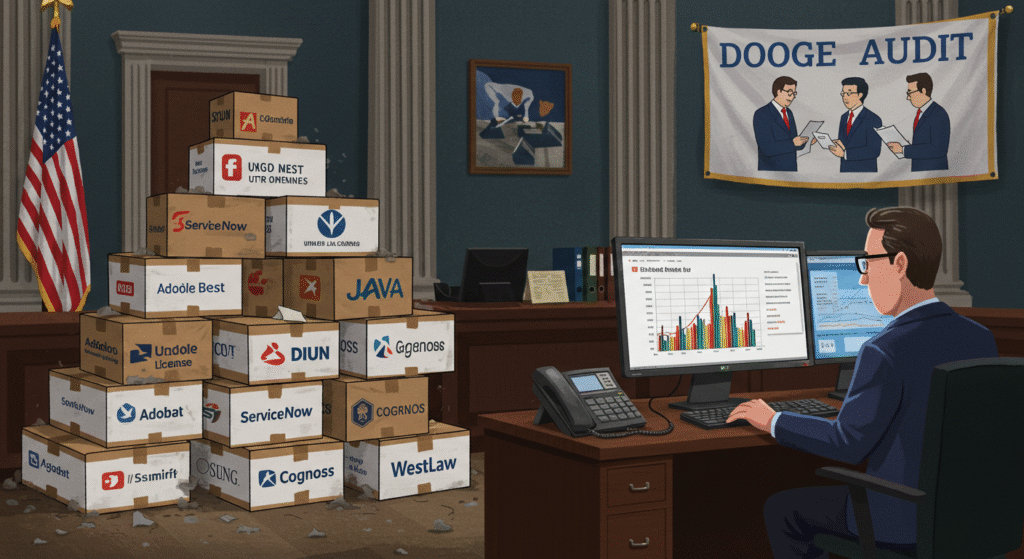The Department of Government Efficiency (DOGE) checked software licenses at the U.S. Department of Housing and Urban Development (HUD). The audit found thousands of licenses not used. For example, HUD paid for 11,020 Adobe Acrobat licenses, but nobody used them. These numbers seem like a big waste. But the story is not that simple. Why does HUD have so many licenses? How does the government buy software?
What Is the DOGE Audit at HUD?
The DOGE audit looked at HUD’s software licenses. HUD is a government agency. It helps people get housing. It uses software to manage money, track data, and follow rules. The audit found many licenses paid for but not used. The report came out in March 2025. DOGE wants to stop government waste. The audit shows HUD spent money on tools it didn’t use. But there’s more to know. The numbers don’t tell the whole story.
Why Do Numbers Need Context?
The audit’s numbers sound bad. For example, HUD had 35,855 ServiceNow licenses but only 84 users. That’s less than 1% used. It looks like waste. But numbers alone can trick you. HUD buys licenses for many reasons. They might buy extra for later. Contractors might use some. Old systems need special software. Without these details, the audit seems to show only waste. But it’s more complicated. A former official told WIRED that agencies buy extra licenses to plan ahead. This isn’t always bad.
How Did DOGE Do the Audit?
DOGE checked HUD’s software records. They looked at what programs were on computers. They counted how many people used each program. They also checked what HUD paid for. The audit found big gaps. For example, HUD had 10,000 Java licenses but only 400 users. It had 800 WestLaw Classic licenses with 216 users. These gaps show HUD paid for tools it didn’t use much. But the audit didn’t say why HUD bought so many licenses. This makes it hard to understand the full picture.
Why Does HUD Have So Many Licenses?
HUD has lots of licenses because of how government agencies work. They sign big contracts for many years. These deals give discounts but include extra licenses. HUD needs many tools for housing programs. ServiceNow helps with IT tasks. Cognos looks at data. Adobe makes documents. Contractors also need licenses. They work for HUD but aren’t full-time staff. Some old systems use outdated software like Java. These licenses may look unused but keep systems running. A 2024 report by the Government Accountability Office (GAO) said 41% of HUD’s software didn’t pass checks. This shows tracking licenses is hard.
How Much Money Is Involved?
Unused licenses cost a lot. The audit suggests HUD spent millions on tools it didn’t use. For example, 11,020 unused Adobe Acrobat licenses could cost $2.64 million a year. That’s based on $20 per month per license. ServiceNow licenses, with 35,771 unused out of 35,855, could cost millions more. ServiceNow is a pricey tool. Cognos licenses, with 1,451 unused, also add up. DOGE’s X posts say unused licenses across the government could waste $100 million a year. But we don’t know exact costs. The audit didn’t share contract details.
Challenges in Managing Software
Big agencies like HUD have trouble managing software. They use old technology. Some systems are from years ago. They need special software that looks unused. Buying software is slow. Agencies buy extra to avoid waiting later. Tracking licenses is tough. HUD doesn’t always know who uses what. Software companies offer big deals. Agencies buy more to save money over time. A HUD spokesperson told Fox News that some licenses were for future projects. This shows not all unused licenses are waste.
DOGE’s Role in Fixing Waste
DOGE wants to make government spending better. It’s led by people like Elon Musk. The HUD audit is one part of their work. They also found waste elsewhere. For example, the General Services Administration had 37,000 WinZip licenses for 13,000 workers. The Department of Labor had 380 unused Microsoft 365 licenses. DOGE says cutting these saves money. But experts warn that cutting too fast could hurt work. HUD might need extra licenses for new projects. Finding a balance is important.
How Can HUD Do Better?
HUD can save money by managing licenses better. They can use tools to check what’s used. This stops buying too many. They can review contracts with software companies. This cuts unneeded licenses. Planning purchases carefully helps. HUD should buy only what it needs now. New tools can replace old systems. This reduces special licenses. A 2023 GAO report said better tracking could save millions. HUD is now checking its software, says a spokesperson. These steps can help HUD spend wisely.
Why This Matters to You
Unused licenses affect taxpayers. Money spent on them could help housing programs. The DOGE audit shows where to improve. But it’s not just about waste. HUD has complex needs. It manages housing data and old systems. This requires lots of software. Knowing why licenses go unused helps us understand. It’s about making government work better. This benefits everyone.
What’s Next for HUD and DOGE?
HUD is working with DOGE to fix waste. They’re checking every dollar spent. This could mean better tracking. It could lead to smarter buying. More money could go to housing programs. DOGE is auditing other agencies too. Their work might change how the government uses software. But they must be careful. Cutting too much could hurt HUD’s work. The goal is to save money and keep systems running.
Conclusion
The DOGE software licenses audit at HUD found thousands of unused licenses. Numbers like 11,020 unused Adobe licenses seem like waste. But context matters. HUD buys extra for contracts, contractors, and old systems. They can save money by tracking better and planning smarter. This article used very easy words to explain the audit. It used facts from trusted sources like HUD, DOGE, and GAO. Want to know more? Share your thoughts below or visit HUD’s website for updates.
Disclaimer: This article uses public reports and expert analysis. It is not legal or financial advice. Always ask professionals about software licensing or compliance. The author and publisher are not responsible for actions based on this content.
Explore More
- Ontpeconomy: Buzzword Branding or Emerging Digital Concept?
- Geekzilla Radio: A Tricky SEO Keyword, Not a Real Radio

Jennifer Marshall is a friendly and talented journalist who loves telling stories. She is an expert in writing biographies that make people’s lives shine. With clear and simple words, Jennifer creates engaging stories that everyone can enjoy. With 9 years of experience, her passion for writing helps her connect with readers and share inspiring tales.
